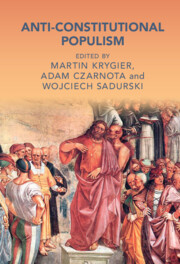Book contents
- Anti-Constitutional Populism
- Cambridge Studies in Law and Society
- Anti-Constitutional Populism
- Copyright page
- Contents
- Figures
- Contributors
- Acknowledgements
- Introduction: Anti-Constitutional Populism
- I Populisms
- II Courts
- Chapter 5 Populism, Constitutional Democracy, and High Courts – Lessons from the Venezuelan Case
- Chapter 6 When Bolsonaro and the Judges Go Shopping – How Brazil’s Legal Elites Opened the Door for Bolsonaro’s Bad Populism
- Chapter 7 Disarming the Guardians – the Transformation of the Hungarian Constitutional Court After 2010
- III Anti-Constitutionalism After Post-Communism
- IV Eu Responses
- V Concluding Reflections
- Index
- Cambridge Studies in Law and Society
- References
Chapter 5 - Populism, Constitutional Democracy, and High Courts – Lessons from the Venezuelan Case
from II - Courts
Published online by Cambridge University Press: 24 March 2022
- Anti-Constitutional Populism
- Cambridge Studies in Law and Society
- Anti-Constitutional Populism
- Copyright page
- Contents
- Figures
- Contributors
- Acknowledgements
- Introduction: Anti-Constitutional Populism
- I Populisms
- II Courts
- Chapter 5 Populism, Constitutional Democracy, and High Courts – Lessons from the Venezuelan Case
- Chapter 6 When Bolsonaro and the Judges Go Shopping – How Brazil’s Legal Elites Opened the Door for Bolsonaro’s Bad Populism
- Chapter 7 Disarming the Guardians – the Transformation of the Hungarian Constitutional Court After 2010
- III Anti-Constitutionalism After Post-Communism
- IV Eu Responses
- V Concluding Reflections
- Index
- Cambridge Studies in Law and Society
- References
Summary
What are the roles of courts in the context of populist government? To what degree – and why – do they collaborate with the initiatives of a populist leader or, instead, use their powers to hold these leaders accountable? Building upon a growing body of work focused on the judiciary and the prospects of the rule of law and populism, this chapter discusses how and to what effect high courts are politicised by populist administrations. It focuses on the role of the Venezuelan Supreme Tribunal (Tribunal Supremo de Justicia, TSJ) under Hugo Chávez (1999–2013) – when this role was transformed – with brief comments about the ‘post-populist’ phase of Nicolás Maduro (2013–present). In particular, this chapter discusses three phenomena that are likely to occur in a variety of populist contexts:
(a) crafting a politicised, submissive judiciary, especially via judicial appointments and/or ‘court packing’ incidents;
(b) the reactive role of the judiciary vis-à-vis constitutional and legal challenges attempted by political opponents; and
(c) the courts’ proactive role in response to requests filed by pro-government actors.
- Type
- Chapter
- Information
- Anti-Constitutional Populism , pp. 185 - 219Publisher: Cambridge University PressPrint publication year: 2022
References
- 1
- Cited by



